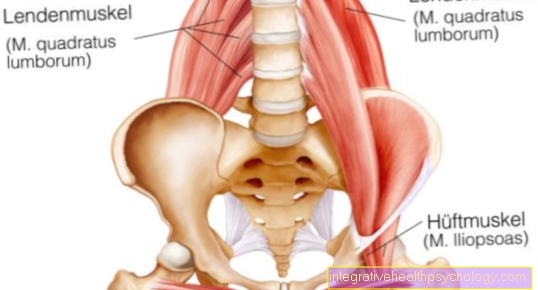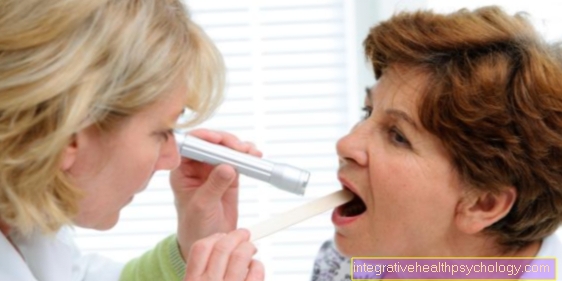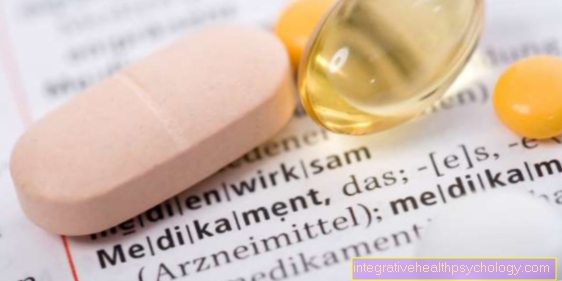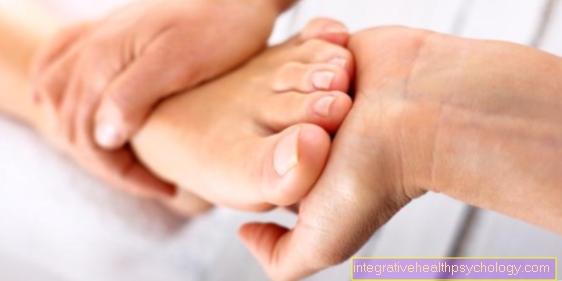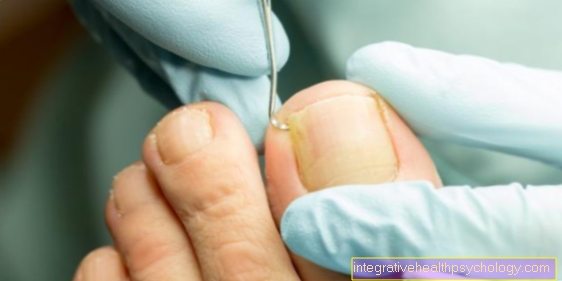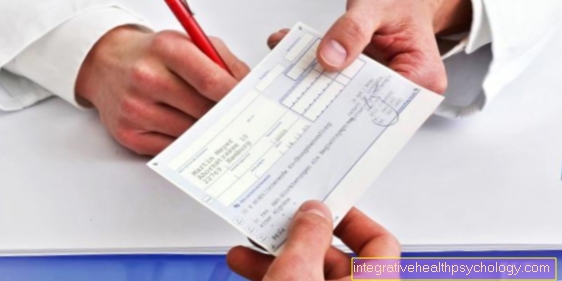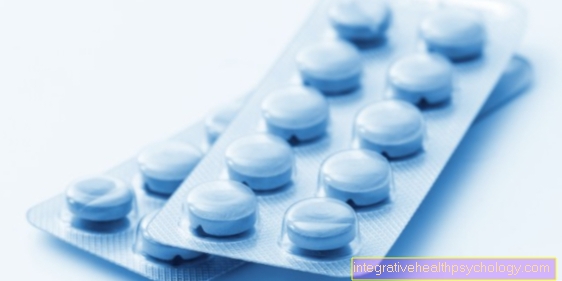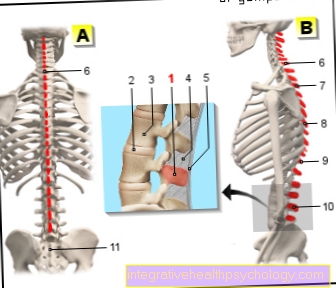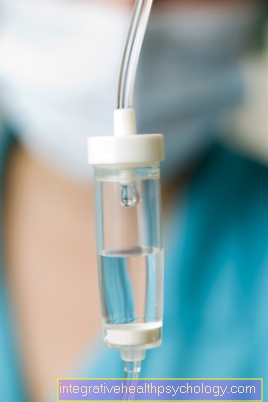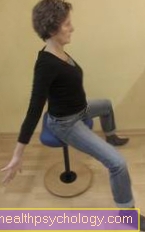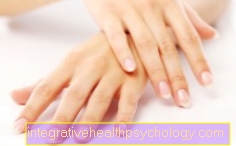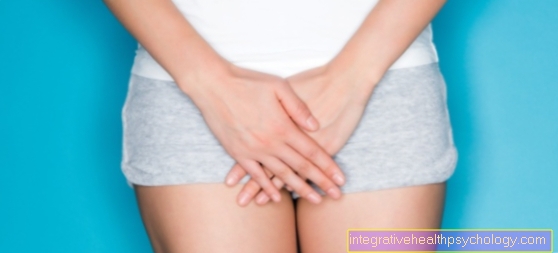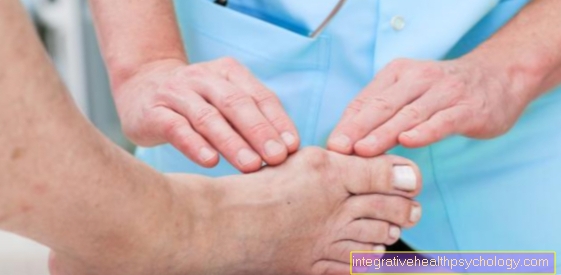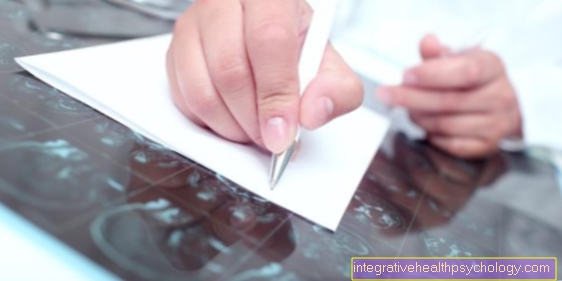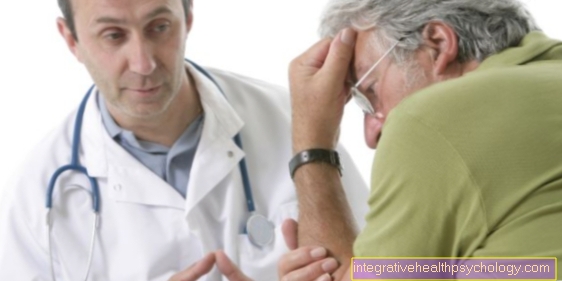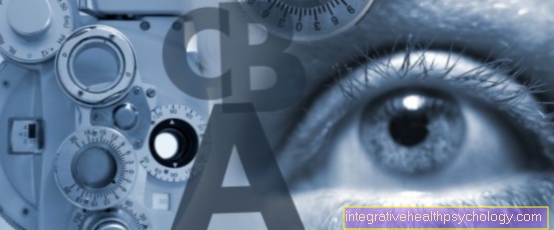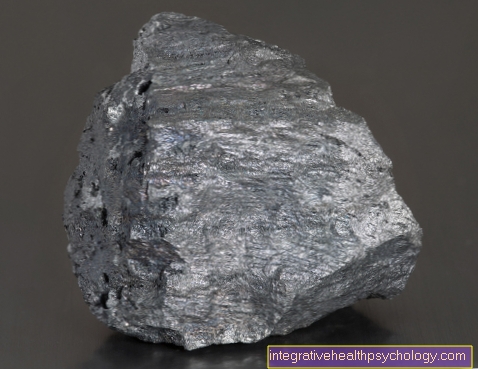Risperdal® side effects
introduction
The drug Risperdal® contains the active ingredient risperidone and is used in the therapy of schizophrenia and delusional disorders due to its antipsychotic and sedative effects. In addition, also with hallucinations, psychoses, obsessive-compulsive disorder or aggressive behavior.
Risperdal® belongs to the subgroup of atypical neuroleptics, which, in contrast to the conservative neuroleptics, have fewer undesirable effects. Risperdal® is highly effective.
Read more on the topic: Risperdal®
Mechanism of action of Risperdal®
In order to understand the origin of the different side effects, it is important to start with Mechanism of action to understand. Mental disorders are listed most frequently today Malfunctions the neurotransmitter Dopamine and Serotonin back, which is why the corresponding structures in brain that are involved in the production, transmission or action of the transmitters are inhibited.
The medication inhibits the transmitter's influence on the brain and psyche. Risperdal® mainly inhibits the target structures of the transmitter Serotonin thus blocking the effects of serotonin. On the Dopamine receptors Risperdal® does not respond well and therefore causes fewer side effects that are specific to dopamine receptors.
However, the active ingredient still has a certain affinity for two other transmitter systems: Adrenergic receptors, for example adrenaline binds, and the Histamine receptors (Among other things, histamine is responsible for the development of allergic reactions). Further side effects are derived from the affinity for these two receptors.
Risperdal® side effects
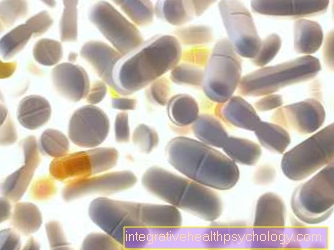
Risperdal® triggers a number of side effects. In the following some important ones are taken up and presented.
A common side effect of drugs for schizophrenia is the occurrence of persistent extrapyramidal motor movement disorders caused by the inhibition of the dopamine receptor. Dopamine is important for the initiation and the harmonious flow of movements. By blocking dopamine receptors, movement disorders can now occur to varying degrees.
These range from early dyskinesias (Cramps in the facial expressions and tongue muscles) about Parkinson's-like symptoms (Rigidity, trembling, immobility, rigid facial expressions) and akathisia, a tormenting motor restlessness, to tardive dyskinesia, which can persist even after months and years and even after discontinuing the medication.
Due to the low affinity of Risperdal® for the dopamine receptors, extrapyramidal motor movement disorders (EPS) comparably low. The occurring EPS is related to the dose of Risperdal®. At low doses, there are hardly any EPS, but from a dose of 6 mg per day symptoms similarly severe and frequent as with classic preparations.
Therefore application security is (Therapeutic breadth) of the drug very tight (less than 6mg / day).
The transmitter dopamine is also important for the regulation of the Distribution of further transmitters. Dopamine suppresses the release of the hormone Prolactin. Prolactin is an important hormone in the pregnancybecause it ensures the growth and differentiation of the Mammary gland. It also stimulates the Milk production.
If dopamine is now suppressed by Risperdal® and other drugs, it cannot pursue its original effect and the prolactin release cannot be inhibited. The increased prolactin levels contribute to both sexes to a Growth of the mammary gland.
In addition, the libido of the man due to the increased release of the hormone. In women there are also one Milk flow from the mammary gland and that Missing menstruation to name as side effects.
This increased prolactin secretion and its consequences are also a side effect of Risperdal®.
Furthermore Risperdal® inhibits the Histamine receptors and the Adrenergic receptors (above all alpha-1 receptors). By blocking these receptors, Risperdal® triggers further side effects:
Dry mouth, Gastrointestinal complaints (diarrhea, constipation, nausea, stomach pain, stomach pain, Indigestion, altered appetite), Visual disturbances With blurred vision, confusion, Racing heart, fatigue, Tendency to sleep and Listlessness.
Taking Risperdal® can also change your EKGs trigger, in particular the conduction is often lengthened, as Risperdal® reduces the excitation of the Heart blocked. These changes are particularly common Taking multiple medications observed.
With Risperdal® you can also Cardiac arrhythmias occur or become worse.
The drugs also have an effect on that Blood formation (fewer white blood cells) and the Blood count in general, which is why the blood count during long-term therapy with neuroleptics (not just Risperdal®) should be checked regularly.
Rare to step serious side effectsn on. When taking any neuroleptic medication (also Risperdal®) it can lead to the occurrence of one Neuroleptic Malignant Syndrome come in the first two weeks of neuroletic therapy.
The symptoms are: High fever, EPS, vegetative disorders, metabolic acidosis (Hyperacidity), comatose states and a Increase in kidney enzymes. In this very rare case, therapy is required immediately be terminated.
Weight gain
In particular through the Blockade of the histamine receptor Risperdal® leads to a Weight gainby a previous Hyperglycemia (too much sugar in the blood) is reinforced. A cause of weight gain that should not be underestimated is the need sugary drinks to consume what the existing Dry mouth and the Tooth status deteriorated.
The metabolic side effects increase with the duration of therapy and are generally held responsible for the increased mortality from the use of neuroleptics.
Side effects on the eye
Risperdal® triggers numerous side effects on eye From the very diverse could be. The patient often sees through taking Risperdal® blurredwhereby the Risk of falling increased in everyday life. Occasionally, diffuse symptoms appear, such as Conjunctivitis by dry eyes, Eye redness, Eye discharge by increased tear secretion and Swelling of the eyes.
Risperdal® can also use the Intraocular pressure increase and in the long term the emergence of a cataracts favor. That's why regular checks of the eyes is important to the ophthalmologist.
Risperdal® and alcohol
During therapy with Risperdal®, alcohol consumption is to be restricted avoid, because the alcohol effectiveness of the drug in unpredictable ways changed can be and the Side effects increased can be.
Most of the time, the effects of the alcohol are much stronger when the patients take Risperdal® at the same time. Especially through the reality-changing effects of alcohol It can be difficult for patients with a psychosis to assess reality correctly and in the long term to become one Reinforcement of psychosis to lead. For these reasons, those affected are not advised to consume alcohol.
Use of Risperdal® in children with autism
Drug treatment of autistic patient becomes extremely cautious designed and only used for long-lasting symptoms. It is important to clarify beforehand whether the behavioral problem is also no other cause may have.
Psychopharmacotherapy at autism aims the Main symptoms to alleviate. The atypical neuroleptics such as Risperdal® can be found at Hyperactivity and impulsiveness, Rigidity, and (automobile)-aggressiveness and affective symptoms Application and have besides Antidepressants the highest priority.
Early behavioral therapy with pharmacological interventions can cause problematic behavioral disorders such as Outbursts of anger and aggressions, effectively reduce. The specific indications of Risperidone are in addition to the above compulsive behavior and Stereotypes.
In general, Risperdal® is only for Short term treatment (up to 6 weeks) at Children with intellectual disabilities from 5 years authorized. Children under 5 years of age are excluded from treatment with risperidone due to lack of experience.
The dose depends on the Weight of children and can slowly dosed become. For therapy of a schizophrenia or mania should children under 18 years not be treated with risperidone. The above side effects also apply to children, especially those Weight gain is a major problem in treatment with Risperdal®.
Discontinuation of Risperdal®

Discontinuation of neuroleptics and Risperdal® can Withdrawal symptoms trigger the image of the original psychological problem are very similar. The range of symptoms is very wide and encompassing aggressions, destructive behavior, depressive moods, fear and restlessness.
In addition to the psychological symptoms of inflammation, the lack of the active ingredient also manifests itself more organic (all of the above organ systems) and motoric (Dyskinesias) Level.
In order to make the condition as comfortable as possible during and after discontinuation, the intake of Risperdal® creeping be terminated in which the dose about a long period again and again reduced becomes.
Contraindications
The contraindications result from the Side effects. Patients who already suffer from the symptoms mentioned above without taking Risperdal® should not be treated with Risperdal®. Risperdal® should be taken by patients with Heart problems be weighed carefully, with some heart diseases (e.g. Cardiac arrhythmias) Risperdal® is contraindicated as the excitation of the heart is inhibited.
Through the antihypertensive Risperdal® should also have an effect on existing low blood pressure or one drug-controlled high blood pressure not or only especially careful be prescribed as the Blood pressure could drop even further. In this context, it is also important that Risperdal® is not prescribed if it is increased Stroke risk because the incidence of strokes is increased with Risperdal®.
Patient with Parkinson's, dementia, diabetes, Obesity, Blood disorders or Convulsions (epilepsy) are also not suitable for therapy with Risperdal®.
Furthermore, Risperdal® is contraindicated if already before the start of therapy Prolaction Levels is increased that Menstrual period is absent and one Gynecomastia consists.


